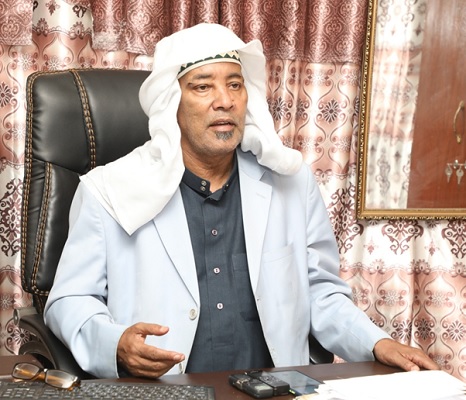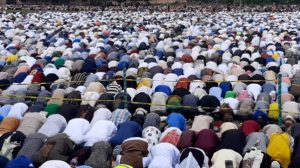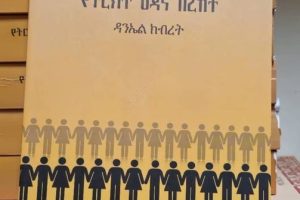
The streets of Addis Ababa get filled with the sounds of joyous celebration as Ethiopian Muslims gather to observe Eid al-Adha, the Islamic festival of sacrifice, on June 16. Eid al-Adha commemorates the willingness of the prophet Ibrahim (Abraham) to sacrifice his son as an act of obedience to God. It is one of the most important religious holidays in the Islamic calendar and is celebrated worldwide by the faithful of the Islamic religion. In Ethiopia, which has a Muslim population of over 34 million, the occasion is marked by special prayers, feasting, gift-giving, and acts of charity.
“Eid al-Adha is a time for us to reflect on our faith, strengthen our bonds with family and community, and share our blessings with those in need,” said Fatima Ahmed, a resident of Addis Ababa.
Early in the morning, worshippers gather at mosques across the capital city to perform the Eid prayer. The main event is held at the historic Anwar Mosque, where thousands of people, dressing in their finest traditional attire, filling the courtyard to take part in the communal prayers usually led by Islamic scholars.
“The Eid prayer is a profound experience, where we brush shoulders as equals before Allah,” said Ismael Hassen, a 42-year-old businessman. “It fills us with a sense of unity and belonging to the global Muslim community.”
Following the prayers, families return to their homes to enjoy special Eid meals, often featuring dishes like Doro Wat (chicken stew), Injera (flatbread), and traditional sweets. Children eagerly await the gifts of new clothes, toys, and cash from their elders.
But the spirit of Eid al-Adha goes beyond personal celebration. Across Ethiopia, Muslims engage in acts of charity and humanitarian support. Many slaughter livestock and distribute the meat to the less fortunate, in keeping with the tradition of sacrifice and generosity.
Eid al-Adha is a reminder that we must look beyond our own needs and care for those who are struggling. It is a time to strengthen our commitment to social justice and community welfare.
As the sun sets over Addis Ababa, the streets reverberate with the sounds of laughter, songs, and the calls to prayer. For Ethiopia’s Muslims, Eid al-Adha had once again brought the nation together in a celebration of faith, family, and the pursuit of a more just and compassionate society.
Muslims perform the Eid prayer in the morning and may also carry out the ritual sacrifice of cattle (known as udhiyah). Pilgrims who have performed the Hajj complete additional rituals on Eid al-Adha. It is sometimes called the “Greater Eid.”
The 1445th Eid al Adha (Arafat) will be celebrated in a warm atmosphere among the Ethiopian Muslims. Followers of the religion celebrate the festival by slaughtering animals and the religious teaching is that they should take their share of the slaughtered animals and distribute the rest to relatives and the poor, said Imam of Anwar Mosque Haji Toha Harun. Always Eid al-Adha is celebrated with love, unity, and brotherhood, he said, adding that the Muslim community should preserve their Ethiopian unity and brotherhood.
Haji Toha Harun told the Ethiopia Press Agency that able-bodied people buy sheep and goats and slaughter them and distribute the meats to the poor and dine and enjoy tea and soft drinks together. Al Adha is known as the festival of charity because it is the teaching of the religion to share the animals slaughtered for the poor.

Eid al-Adha is the second and biggest of the two main holidays celebrated in Islam. It honors the willingness of Ibrahim to sacrifice his son Ismail as an act of obedience to Allah’s command. The act of sacrifice is carried out following the Eid Prayers, which are performed in congregation at the nearest Mosque on the morning of Eid and consist of slaughtering an animal as a sacrifice to mark this occasion in remembrance of Prophet Ibrahim’s sacrifice for Allah.
The mutual aid should continue not only once a year during the festival but also at other times, Haji Toha said, adding that building and repairing houses for the poor, feeding the hungry, clothing those with tattered clothes, and helping orphans will be popular activities during Eid al Adha. According to Islamic teachings, it is wrong to ignore people exposed to natural and man-made disasters, displaced people, hungry and thirsty people and we should help the poor and vulnerable people, he said.
On the other hand, Islamic religious education supports the ongoing work of building and repairing houses for the poor through civic service delivery, he said.
Understanding the situation in our country and helping the displaced people and those in various difficulties to provide necessary support is a blessed work, loved by Allah and man.
Sharing with the poor, especially during festivals is a recently developing and spreading custom and tradition, he said, adding that this custom and tradition of helping and supporting each other must continue to spread in the country.
BY NAOL GIRMA
THE ETHIOPIAN HERALD SUNDAY EDITION 16 JUNE 2024





